Effective, Purposeful Leadership for Executives
By
Westmont
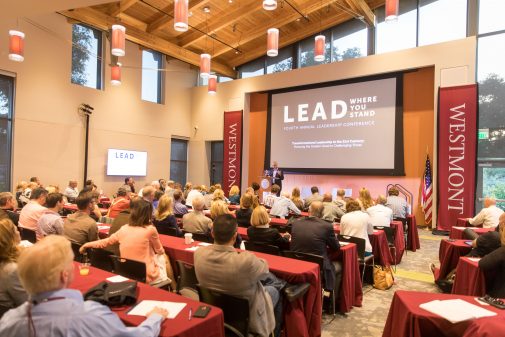 Westmont’s fourth annual Lead Where You Stand Conference, June 6-8, 2018, helped executives and executive teams strengthen their leadership skills through three days of engaging, inspiring and practical sessions at the new Global Leadership Center. David Brooks, Doris Kearns Goodwin, Lynda Weinman and President Gayle D. Beebe delivered keynote talks on the theme “Transformational Leadership in the 21st Century: Pursuing the Greater Good in Challenging Times.” Nine Westmont professors or administrators and three alumni addressed a range of topics in shorter presentations. The Mosher Center for Moral and Ethical Leadership and the Brittingham Family Foundation sponsored the conference.
Westmont’s fourth annual Lead Where You Stand Conference, June 6-8, 2018, helped executives and executive teams strengthen their leadership skills through three days of engaging, inspiring and practical sessions at the new Global Leadership Center. David Brooks, Doris Kearns Goodwin, Lynda Weinman and President Gayle D. Beebe delivered keynote talks on the theme “Transformational Leadership in the 21st Century: Pursuing the Greater Good in Challenging Times.” Nine Westmont professors or administrators and three alumni addressed a range of topics in shorter presentations. The Mosher Center for Moral and Ethical Leadership and the Brittingham Family Foundation sponsored the conference.
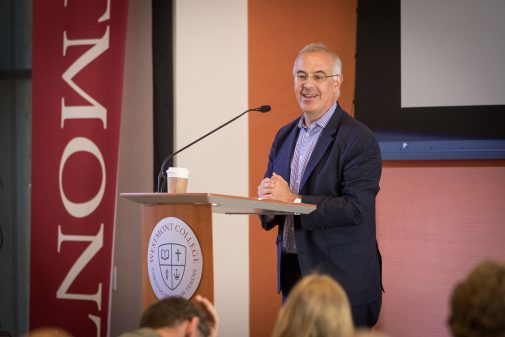
A Day with David Brooks
The New York Times columnist, commentator and bestselling author says life has a two-mountain shape. The first mountain is building our career and family, but reaching the top can feel unfulfilling. Finding ourselves can lead us to scale a second mountain to a more meaningful life. We can fall or get knocked off the first mountain by events in life, and how we navigate the valley reveals our character. We emerge a different person as we start up the second mountain.
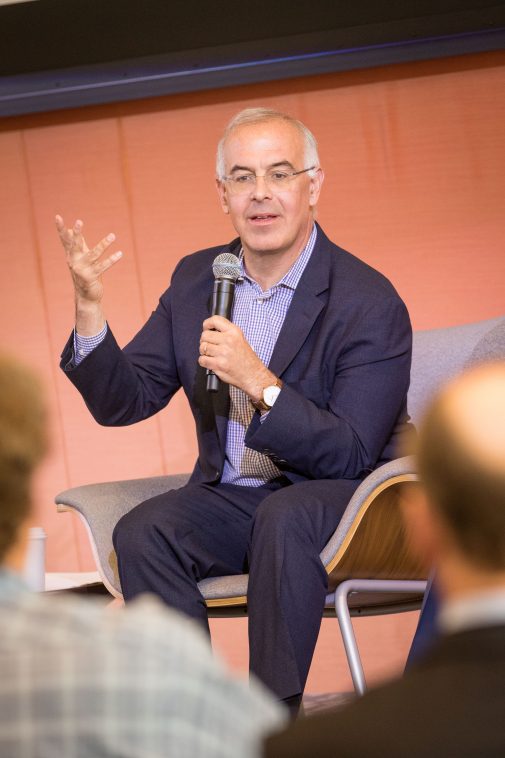
Quoting Frederick Buechner, Brooks encourages us to listen to our life and see it for the profound mystery it is. All moments are key moments, and life itself is grace as we realize we don’t deserve the happiness we have. Looking back, we can find moments when the theme or purpose of our life becomes clear, and we should embrace the wonder of it. How we define our role in life doesn’t depend on what we do.
Brooks identifies three crises in our culture: isolation, alienation and a lack of meaning and purpose. We’re lonelier and more likely to live alone, and we don’t trust institutions or our neighbors. The generation that lived through the Depression and World War II believed they were all in it together. Today, we’re pleasing ourselves. Eventually, that leads to tribalism, which focuses on scarcity rather than abundance as tribes consider gains by others as utter ruin. Negative polarization results when people hate other tribes and fail to love their own.
How can the country recover from tribalism? Brooks anticipates a civic revival—not a religious one— with hundreds of groups emerging to rebuild community and find meaning on the local level. He encourages us to build social capital and to remember that programs don’t turn around lives, relationships do—and society is a system of relationships. We contribute to a national recovery when we build on what we share and support people creating civic institutions. Change occurs when small groups on the margins of society figure out a different way to live, and others come over to their side. He believes societal change always follows personal transformation.
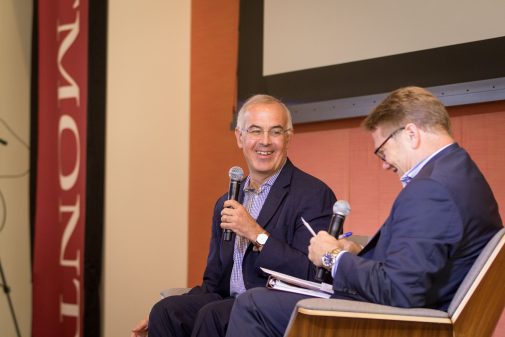
When we fall in love, we make a covenant because we want love to last forever. Unlike a contract, a covenant involves a promise and a relationship; we affirm that the relationship is more important than we are. Brooks hopes we can move away from tribalism and toward a covenant in our culture and find a national story we can all embrace.
Brooks says the University of Chicago sought to make him a certain kind of person when he studied there. Today, colleges focus on research and specialization. Chicago welcomed him into a long line of scholars and introduced him to a philosophy of life by exposing him to various traditions. He learned how to see reality, not just what he wanted to see. Through literature and music, he discovered how to react emotionally to the world. Finally, he found higher things to love, discovering that beautiful things lead us even higher to greater beauty and transcendence. Peter Drucker told managers to raise people to a higher standard, and that’s what colleges should do, Brooks says.
How do we build character and overcome sin? Self-control programs don’t work. Because the conscious brain is such a small part of our conscience, we’re not good at controlling our will. Brooks believes we build character not by having great willpower but by having great desires and great love—by desiring to do the right thing, honoring our obligations, and entering into loving relationships. Finding something to love transforms us. We let the world happen to us rather than making ourselves the center of it. We develop humility. Then, as we learn to love God, we do things important to God.
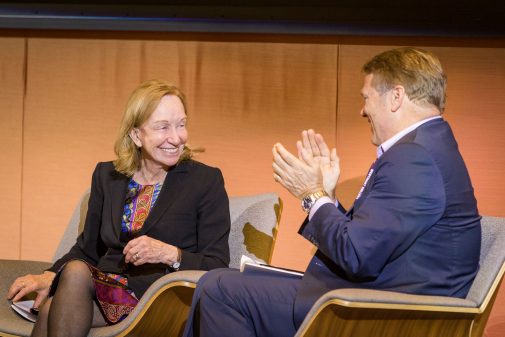
“Leadership Lessons from History: FDR and Eleanor Roosevelt"
Has the country ever faced such turbulent times before? Doris Kearns Goodwin says we have. This Pulitzer Prize-winning biographer detailed the effective leadership of four great presidents well fitted for their times: Abraham Lincoln, Theodore Roosevelt, Franklin Delano Roosevelt and Lyndon Johnson. She tells fascinating stories about them illustrating their strengths and character. All of them overcame significant hardships and crises in their lives, including a lack of formal education, the death of close family members and serious illness. They learned to motivate themselves through adversity and possessed an unusual determination to succeed.
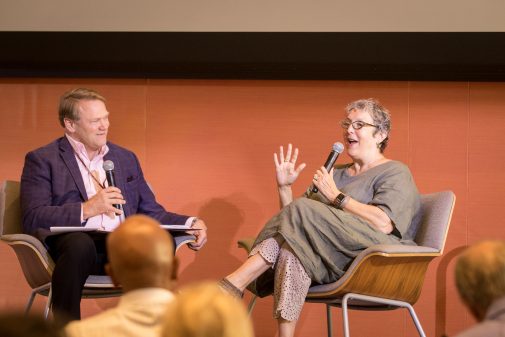
A Fireside Chat with President Gayle D. Beebe and Lynda Weinman
Lynda Weinman, cofounder of Lynda.com, says the good thing about learning online is that you can go at your own pace and review material whenever you want. The educator becomes the mentor and supporter instead of the person holding all the knowledge. She stumbled on the idea of online education at the right time with the right people who all loved what they did and kept taking it further. Completing her undergraduate degree at a liberal arts institution gave her a great feel for all the dimensions involved in starting, growing and sustaining a company that meets a significant need in modern society. Luck also played a role in her success as she lived in the dawn of the computer age and internet. She enjoyed paying her people well and didn’t consider that a personal loss.
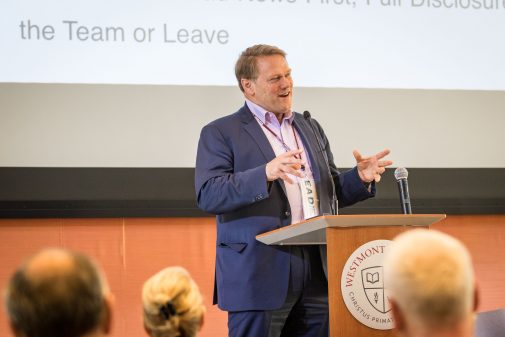
“Effective Leadership and the Essential Contribution of Teams”
Quoting Peter Drucker, “Management is work for a team,” Westmont President Gayle D. Beebe identified qualities of effective executive teams: high capacity and commitment, emotional intelligence, loyalty, working toward common goals while managing individual areas, vision and resilience. He says leaders can achieve strategic effectiveness through a blend of intelligence (education and guided experience), empathy (moral and emotional intelligence), and creativity (innovation and strategic risk-taking). Emotional intelligence requires self-awareness, awareness of others, self-regulation and social regulation—including cyber disinhibition, which requires resisting quick, angry responses to online information.
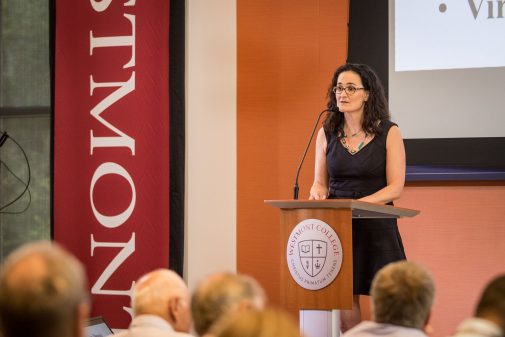
“Lead for Life: The Impact of Developmental Psychology on our Leadership”
Andrea Gurney, professor of psychology at Westmont, says the most effective leaders posses a high degree of emotional intelligence: self-awareness, self-regulation, empathy and social awareness, and relationship management and social skills. Thanks to the gift of neuroplasticity, the brain can form new habits through the intentional act of focusing our attention—although it takes three to six months for the new habit to replace the old one. Developing self-restraint helps leaders concentrate on future goals with single-minded devotion, and empathy allows them to understand what people feel and need.
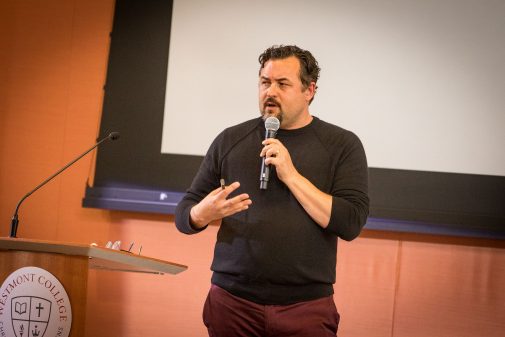
“The Architecture of Effectiveness”
Dane Howard, global head of design and product experience at Samsung NEXT, says the rules have changed. Remote work is working and growing, and leaders should embrace distributed collaboration and the tools that make it possible. Effectively including remote workers in meetings is essential; one innovative strategy puts speakers on the ceiling so people in the room look up when talking to those calling in. Establishing an equal basis for all team members increases productivity, the diversity of ideas and employee engagement and happiness, says this Westmont alumnus. Down time, including rest, prayer, meditation and music, also rewires our brains to be more productive.
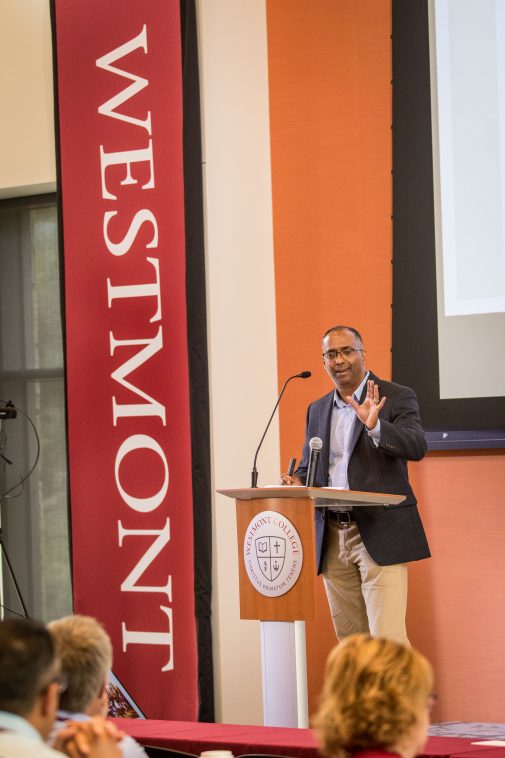
“Power and Privilege: Cultural Clashes and Leadership Malfunctions in 19th Century British India”
Chandra Mallampalli, Fletcher Jones Foundation professor in the social sciences who teaches history at Westmont, discussed bad decisions and poor leadership by the British in 19th century Afghanistan that led to war and many deaths. The collapse of networks of collaboration, trust and patronage and the rise of fear and paranoia contributed to the disaster. Insecurity in a strange place led to extreme use of force and overreaction, and the British made tactical, strategic and moral blunders. He concludes that colonial models are doomed from the beginning as they don’t develop the collaboration and trust necessary for effective government.
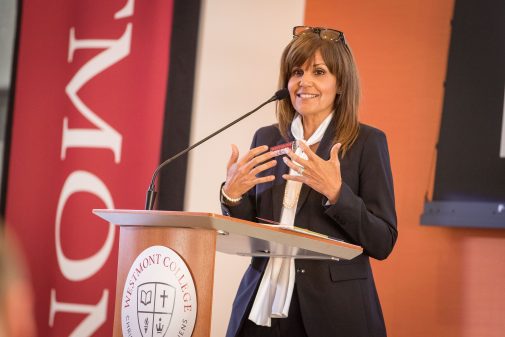
“Stronger Together: Effective Leadership and the Essential Contribution of Teams”
Irene Neller, Westmont’s vice president for enrollment, marketing and communication, says that leadership is a team sport. Fostering teamwork gives employees freedom and grows trust, with full participation leading to full contribution and full ownership. Her team mantras include: no surprises; give each other the benefit of the doubt; unity across leadership, set high standards and achievable and realistic goals; share successes; and celebrate the wins. She promotes forward-thinking, resourceful and solutions-oriented creative collaboration.
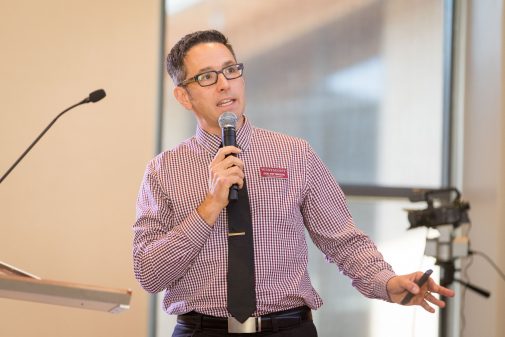
“A.I., Machine Learning and Technology-driven Innovation”
Don Patterson, professor of computer science, says the big bets are on artificial intelligence with the majority of interpersonal communication now computer-mediated. Technology lets us be who we are (good or bad) at greater volume and speed and enables deception as the ancient struggle to discern truth continues. People find it easier to lie through computers, and the more mediated our conversation, the more prone it is to deception with videos that use fake voices and faces. He is developing a website that will help identify fake images and videos online by tracing them back to their origin.
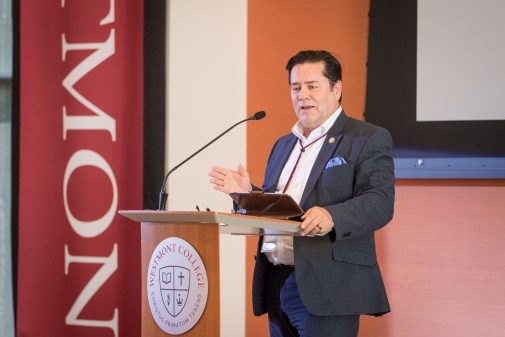
“The Way Forward: Leadership and Innovation in the Halls of Government”
Alumnus Ken Rogers, deputy chief information officer for business, management and planning at the Bureau of Information Resource Management at the U.S. State Department, discussed the challenges of working for the federal government and leading as a bureaucrat when the appointees at the top turn over every three years. Introducing change in a hierarchical, risk-averse agency requires strategic thinking and planning and great hiring decisions. Treating employees at all levels with respect helps him build high-performing teams.
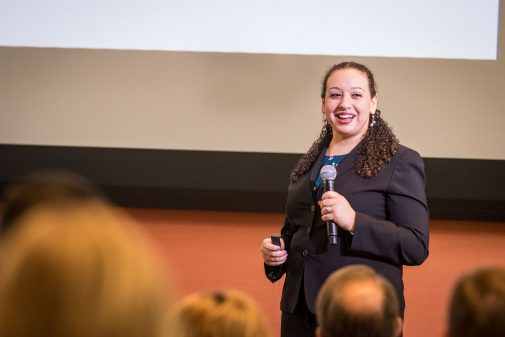
“Hidden in Plain Sight: the Powerful Influence of Implicit Bias on Our Leadership”
Westmont psychology professor Carmel Saad helped participants identify some implicit biases with quick-response exercises. These biases develop over time, and it takes practice to lessen them by overcoming stereotypes, looking for situational explanations instead of blaming people, increasing contact with those who are different, and intentionally focusing on the details that make individuals unique. Developing specific criteria for job positions and using blind practices helps employers hire more diverse workers.
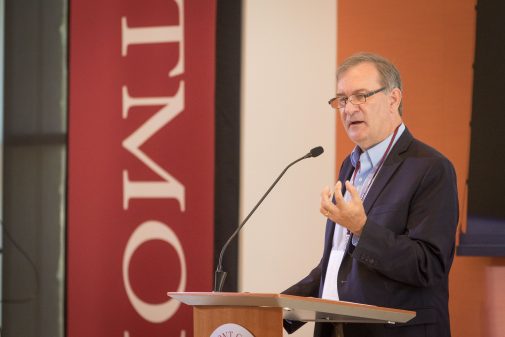
“Leadership and Literature: The Renewing Resources of Classic Literature for Our Daily Work”
Provost Mark Sargent says literature provides the language of empathy, gives insight into human nature, helps readers cross borders to different worlds, and explores leadership and conscience. Hundreds of favorite passages help him think about the world, and he believes we can find touchstones and similarities to our situation in literature. In addition, encountering great literature can help shape our fundamental questions about life. He tells us to bring creativity and improvisation to the classics.
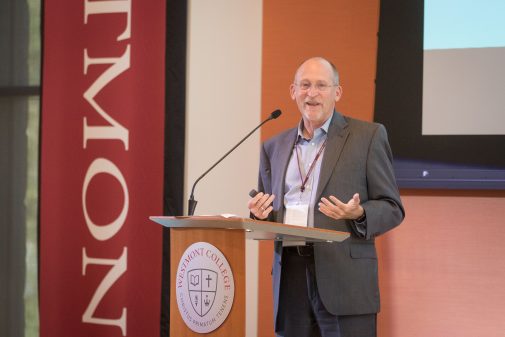
“Leading Innovation: The Rise of Technology and Its Impact Across All Sectors of Society”
Reed Sheard, vice president for advancement and chief information officer, says the right tools with the right people at the right time can be magical. To create this magic, leaders need to study technology, theorize about what will be most effective and then implement it. If they learn how to ride the waves of disruption—the internet of things, machine learning, big data, smart phones and cloud computing—they can create a business that benefits from them.
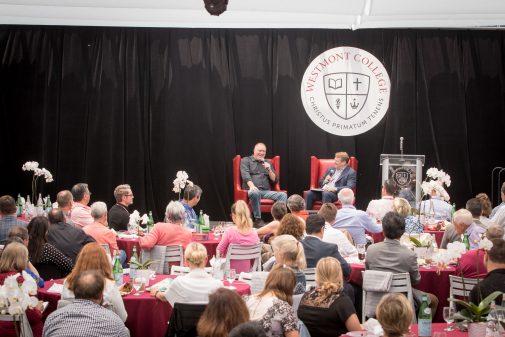
“Leadership Lessons for Getting Started”
Westmont alumnus Jon Walker co-founded AppFolio after realizing that the software of the future would be web-based and cloud-based. He advises entrepreneurs to identify a big trend that will drive their start-up forward. He identifies the values of a company at the beginning and works to create a distinct culture based on those values at it grows. One of his biggest challenges has been developing leaders, and he has created a curriculum to train employees at all levels of leadership.
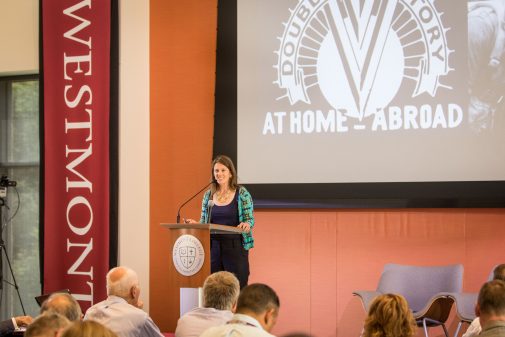
“Innovation, Entrepreneurship, and the Essential Role of Leadership”
Using examples from the life of African-American civil rights and human rights activist Ella Baker, Rachel Winslow, director of the Westmont Center for Social Entrepreneurship, defined “leading with generous creativity” as collaborative, imperfect and redemptive. Baker listened to others in a way that set her apart. Winslow said we need each other to reach our full potential—and we need to listen to the voices around us. She noted that some of the best learning happens in the midst of failure or imperfect situations.
Filed under
Academics, Admissions, Alumni, Campus Events, Campus News, Faculty and Staff, Featured, Giving, Lectures, Press Releases